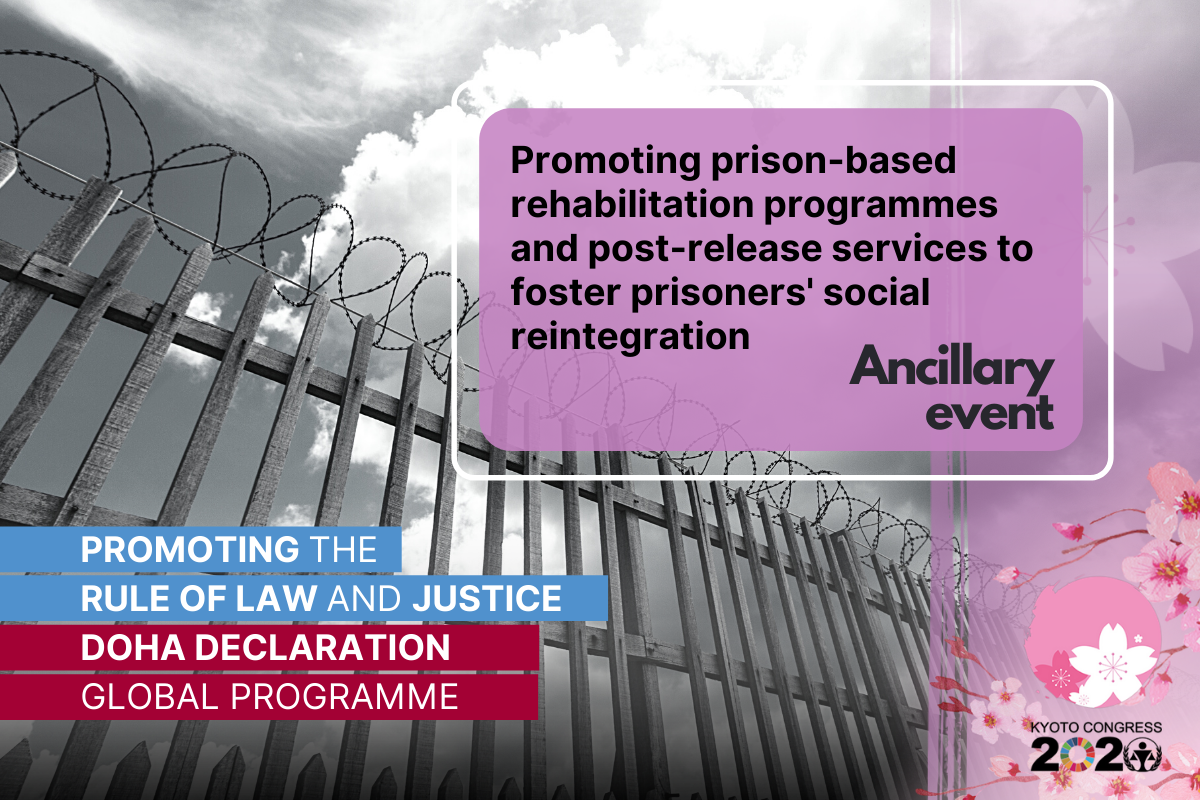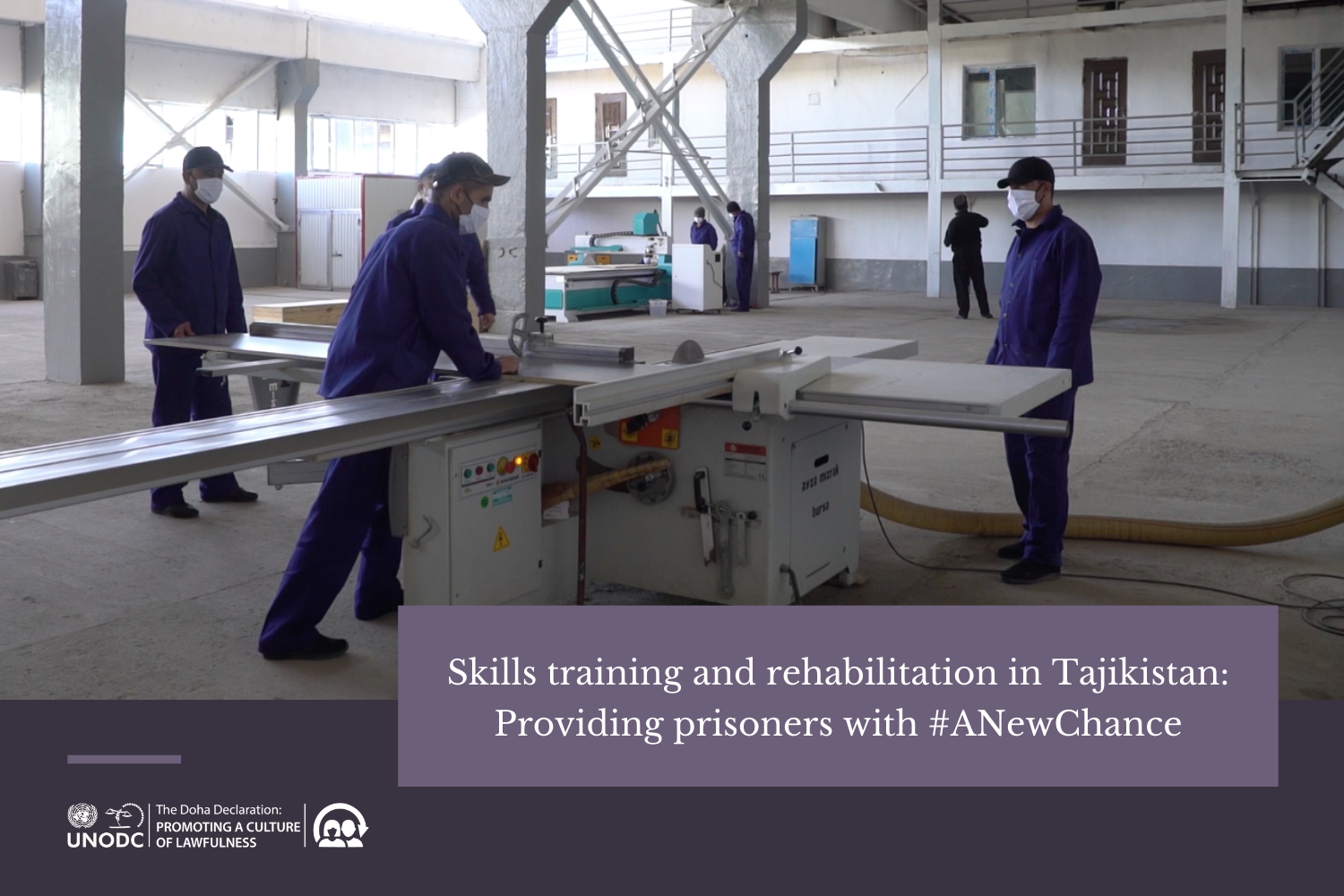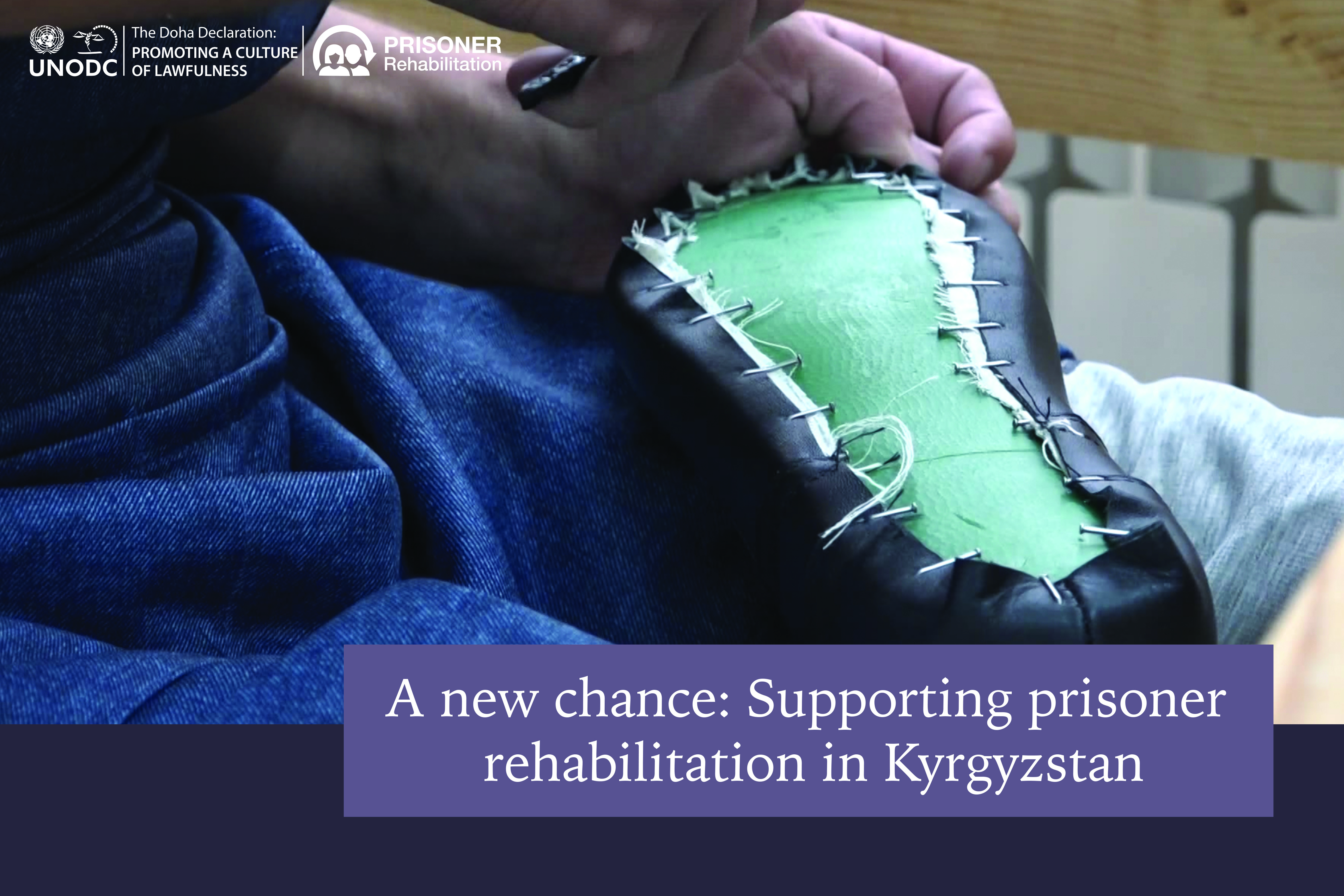Promoting safety and rehabilitation in prison during the most unusual of years
21 December 2020 – The year 2020 has been a challenging one for people across the globe, with COVID-19 impacting individuals and entire societies physically, mentally, socially and financially in an unprecedented manner. For those in prison though, as well as for the officers in charge of looking after them, the pandemic has proven even more potentially devastating. With factors such as poor hygiene conditions and oftentimes overcrowding, living and working in close proximity makes it near impossible to follow recommended measures, such as frequent handwashing and social distancing.
As the custodian of the revised United Nations Standard Minimum Rules for the Treatment of Prisoners – the Nelson Mandela Rules, which this year marked the fifth anniversary since its adoption – UNODC’s work in this area is centred around two key parts: criminal policy reform, and rehabilitation and social reintegration programmes for prisoners. As it relates to the latter, the Doha Declaration Global Programme delivered a range of key activities as this year unfolded, with the unique challenges facing prisoners and prison administrations forcing new approaches and adjustments.
Indeed, considering the unprecedented health and safety challenges in prison settings brought on by COVID-19, and with the vulnerability towards the virus a major concern, one key intervention has been how best to contribute to curbing the spread of infections.
To answer this call, UNODC has been working with prison administrations in several countries worldwide to provide emergency assistance through the provision of Personal Protective Equipment (PPE) and hygiene and sanitary items, alongside a range of other elements selected upon assessment of local needs. This support has varied from country to country, ensuring that national considerations as flagged by Prison Administrations were taken into account.
In Namibia, for instance, the Global Programme’s support has included the provision of infrared thermometers, face masks, gloves, and liquid sanitizer, in addition to information and education materials. This also followed what proved to be an extremely timely opening of a new soap manufacturing project in one of the country’s prisons at the start of 2020 – just prior to the now-evident impact that COVID-19 would have. Initially opened as part of the Global Programme’s skills development approach where prisoners could build up practical expertise ahead of release, the machinery was quickly modified to facilitate the production of hand sanitizer, offering a much-needed solution for prisoners and staff.
Elsewhere on the continent, at the Zambian Government’s request, prison improvements were made to ensure that quarantining facilities were available for new prisoners and for those with potential COVID-19. Assistance also included equipping these new facilities by providing items such as mattresses, blankets, bed sheets, electric stoves, ventilating fans, and washing and laundry soap.
In Tajikistan, hospital beds were provided to the Prison Service, while gowns, gloves, sanitizers and antiseptic gels were among those items delivered in Indonesia, reaching prison facilities in remote locations across the country where the capacity and infrastructure of its health facilities are still limited.
Our support to the State of Palestine, Kyrgyzstan and Tajikistan meanwhile included infrared thermometers, disinfectant liquids, masks and protective gowns, and, in Tunisia, the Global Programme will soon be delivering a range of requested PPE items.
Finally, in Latin America, Bolivia and El Salvador were provided with soap, detergents and disinfectants, as well as waterproof personal protective suits, latex gloves, masks, disposable hats and infrared thermometers. In Colombia, PPE and sanitary items will be delivered in the near future.
Away from the provision of these physical lifesaving items, the Global Programme’s training and country-focussed support also took on new forms as the work to assist countries in ensuring post-release continued – albeit in often different formats. New ways were found to provide direct technical assistance in the implementation of prisoner rehabilitation programmes in the three core areas of education, vocational training and prison-based skills development, providing a new chance for offenders to reintegrate into society. In Panama, for example, trainings were held for judges and prison officials on the impact of COVID-19 on the rights of prisoners, as well as on the various international standards; in Indonesia, virtual sessions were held with prison staff on designing prison-based rehabilitation programmes and brands of prison products to foster social reintegration; while in El Salvador, online training sessions on highly relevant points such as overcrowding and prisoners’ rights and treatment were held.
Thanks to the use of modern technologies, audiences across the globe were reached in a manner not fully utilized until now, with this virtual approach helping not only with these trainings, but also in the promotion of new guidance materials developed under the auspices of the Global Programme, in a number of languages. This included the roll out of materials such as the Handbook on the Classification of Prisoners and the Practical Guide on Creating a Brand of Prison Products as well as briefings on building prison-based rehabilitation programmes, tackling corruption in prisons, and preventing recidivism and boosting the social reintegration of offenders.
Handover ceremonies, where completed rehabilitation projects are formally given over to authorities to add to their national efforts, also went virtual this year. In Kyrgyzstan, baking, sewing and shoemaking facilities were launched to equip prisoners with income earning skills for use after their release; while in Tajikistan, metalwork and woodwork facilities were also opened, designed with the same post-release future in mind.
In addition to 2020 marking five years since the adoption of the Nelson Mandela Rules, another important anniversary in the area of prisons and prisoners is being marked this year. The United Nations Rules for the Treatment of Women Prisoners and Non-custodial Measures for Women Offenders – more commonly known as the Bangkok Rules – were adopted in 2010, offering specific measures around the very precise needs faced by female offenders. During the trainings delivered to prison officials, the necessity to have a gender-sensitive approach, while developing and implementing rehabilitation programmes in prison for women and other vulnerable groups, has been flagged. The Global Programme has paid particular attention to put into practice those Rules by addressing gender-specific needs of women in prison, including continuing supporting skills-building rehabilitation projects in Bolivia, El Salvador, Indonesia, Kyrgyzstan and Namibia – all of which will cumulatively benefit over 1,500 female prisoners.
2020 has tested the entire globe. Yet, the resilience demonstrated by prison professionals, as well as the larger prison population during these challenging times, has been heartening. As we move towards a post-COVID world, the need to build a more rehabilitative approach to prison management is more critical than ever. Indeed, the approach of “recovering better together” must include all members of society – both prisoners and non-prisoners.
Additional information


